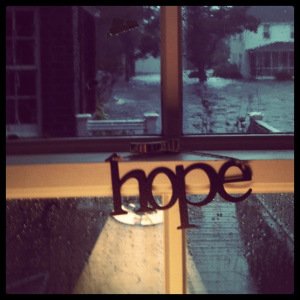I don't believe in God
 Over the years I've come to find that I don't believe in God--I hope in God.I want to share an article on faith and doubt and belief and hope from pastor and writer, Jay Bakker, that resonates so deeply with my own journey from certainty to doubt to the newfound hope and faith I embrace in my life today. Jay writes,
Over the years I've come to find that I don't believe in God--I hope in God.I want to share an article on faith and doubt and belief and hope from pastor and writer, Jay Bakker, that resonates so deeply with my own journey from certainty to doubt to the newfound hope and faith I embrace in my life today. Jay writes,
"I've gone from believing in these things to hoping in them. Because when you believe in something "unseen" to use Paul's word, you become dogmatic. You can't prove it to anyone, and so you end up insisting that you are right instead of insisting on what is right. But hope -- hope leaves room for doubt. Hope embraces your doubt. I hope in God, but I could be wrong. I hope in heaven, but I could be wrong."
Hope means living as if the too-good-be-true Gospel of Jesus Christ, of love and redemption and freedom, is actually true, even if you can't prove it. Even if there are days it makes no sense and the doubts rise up like engulfing waves. Hope means choosing Love and meaning and life amidst the questions. Hope means having faith that we are connected, that our lives matter, that the lives of those around us matter, too.
"With faith, I can work for good in the world. I can see the world in all of its messy, random, meaningless tragedy and say: So what? I'm going to create meaning. I'm going to love my neighbor. I'm going to work to free the oppressed. I'm going to live out grace. I'm going to feed the hungry. I'm going to live as if life has meaning, despite the evidence, and hope that I'm right."
This last paragraph mimics so closely my own journey back to faith, back to hope in the God of Love. The God who is Love. When I lost my certainty in God, in religion, in the black and white I always knew, I found the freedom to love, anyway. To serve, anyway. To hope, anyway. And, somehow, this hope has been much richer and much deeper and much fuller than any certainty or belief I ever had before.To read Jay Bakker's full article on Huffington Post Religion, click here.How about you? How do you handle doubts and questions? Would you say you believe in God or hope in God?
Hope Tour #1: Where Kids Can Just Be Kids
 |
| Workers wait to dig through trash dropped off in the Guatemala City garbage dump Photo Credit: Safe Passage |
 |
| Vultures perch outside the Guatemala City garbage dump Photo Credit: Safe Passage |
 |
| Part of the Safe Passage preschool playground. The blue wall separates the school from the rough neighborhood. |
T.S. Tuesday: What a Difference Hope Can Make
“You do not know what hope is, until you have lost it. You only know what it is not to hope.” T.S. Eliot, Family Reunion
 |
| The Guatemala City garbage dump, where hundreds work each day to support their families. |
Six years ago I came to Guatemala at the end of my semester abroad in Central America. After three months of visiting garbage dumps, hearing rants on U.S. involvement in dictatorial coups throughout Central America, and basically having my entire Christian belief system come crashing down, I was numb and tired. Tired of hearing of injustice. Tired of trying to care.
 Throughout the last six years, I have experienced a Love that saves, a Joy that saves, a Hope that saves. My friends and family and church and coworkers have shown me that my anger doesn’t help the suffering, my hopelessness does not prove my compassion. They have shown me, and God continues to teach me, that Hope brings change, that Joy alleviates suffering, that Love drives out fear.
Throughout the last six years, I have experienced a Love that saves, a Joy that saves, a Hope that saves. My friends and family and church and coworkers have shown me that my anger doesn’t help the suffering, my hopelessness does not prove my compassion. They have shown me, and God continues to teach me, that Hope brings change, that Joy alleviates suffering, that Love drives out fear. “Why would the world need more anger, more outrage? How does it save the world to reject unabashed joy when it is joy that saves us? Rejecting joy to stand in solidarity with the suffering doesn't rescue the suffering. The converse does. The brave who focus on all things good and all things beautiful and all things true, even in the small, who give thanks for it and discover joy even in the here and now, they are the change agents who bring fullest Light to all the world."

